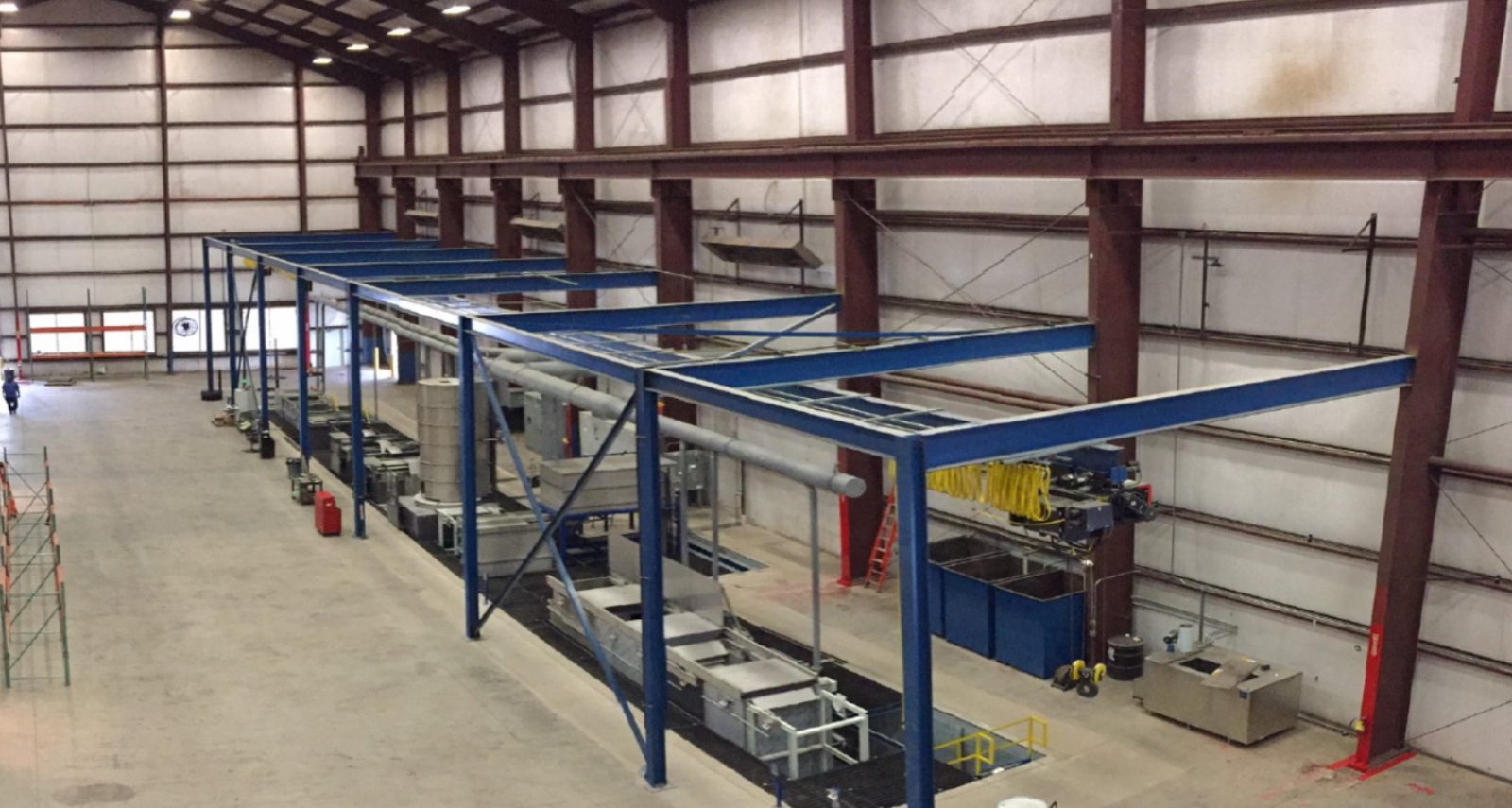An interview with Mr. Shlok Sundaresh , Engineering Manager-TS USA (HEF Group-North America).
 HEF Group, one of the worlds leading providers of Liquid Nitriding and Physical Vapor Deposition Technologies. Today we have An interview with Mr. Shlok Sundaresh, Engineering Manager-TS USA (HEF Group-North America).
HEF Group, one of the worlds leading providers of Liquid Nitriding and Physical Vapor Deposition Technologies. Today we have An interview with Mr. Shlok Sundaresh, Engineering Manager-TS USA (HEF Group-North America).
Shlok to start off perhaps you could give us some background information about yourself, educational background and work experience in the heat treatment industry?
First and foremost, I would like to thank TheMonty.com for this opportunity to share my background, work experience and about my organization – HEF on this prestigious platform.
I earned my Bachelor’s degree in Metallurgy and Materials Science Engineering in 2012 from one of the oldest engineering colleges in India – College of Engineering Pune. As the Student Treasurer of the Indian Institute of Metals (Pune Chapter) that focused on strengthening the industry-academia relationship, this stint provided an opportunity to get acquainted with the heat treatment industry. I interned in the heat treat department at Bharat Forge Ltd. in 2011 and was fascinated with the potential opportunity in this field! I moved to the United States in 2012 to pursue my Masters in Industrial Engineering with specialization in manufacturing at The Ohio State University. As a Graduate Research Associate, I worked on heat treatment modeling and simulations for industry projects and published several research articles in this field with focus on powder metallurgy and liquid nitriding.
After graduation, I joined TS USA (Techniques Surfaces USA – HEF Group) in 2014 and have been working here since then. In parallel, I recently completed a one-year executive education program from Stanford – Graduate School of Business focused on leadership and corporate innovation.
TS USA and HEF are companies which I have little personal experience with. Perhaps you could tell us more about the companies, their relationship and what you bring to the heat treatment/surface engineering industries?
HEF Group, which has been in business for more than 60 years, is headquartered in France and is a leading global provider of surface treatments and coatings for wear, corrosion and friction reduction. Our two primary surface technology options are Liquid Nitriding and Physical Vapor Deposition (PVD – specifically diamond-like-carbon DLC coatings) – the only supplier that offers both technology options. In addition, we do offer a whole range of other surface treatments to meet customer specific needs. HEF is an employee owned company and a majority of our 2,500+ associates are shareholders.
TS USA (Techniques Surfaces USA) is a subsidiary of HEF Group – jobbing network in the United States offering the above-mentioned services. HEF manufactures its own chemicals and equipment for liquid nitriding and PVD coatings while TS network does the processing activity. To summarize, we are a vertically integrated organization offering value-added surface engineering solutions.
What has your career progression at TS USA (HEF Group) been? Along the same lines what are the most interesting aspects in your role as a heat treatment engineer?
I joined TS USA (HEF Group) in 2014 as a Process Engineer for its Springfield, Ohio facility offering liquid nitriding treatments and PVD coatings. As our footprint in the US grew, my responsibilities included other facilities offering liquid nitriding treatments across diverse applications. In 2018, I was promoted to the role of Senior Process Engineer leading process development activities for the US organization. During the same period, I was the resident expert for the automotive heat treatment and coatings management system CQI-9 and CQI-12 that are key requirements for heat treat suppliers per IATF 16949. In 2019, I was promoted to the Engineering Manager position responsible for all process engineering activities of the company. Part of my responsibility includes providing technical support to our licensees on the liquid nitriding service side of the business and assisting our customers in North America on application development utilizing our surface treatments.
There are several aspects of my role that I find interesting. To name a few:
- Visibility and direct impact on application performance with the heat treatment recipe/process developed for our customers.
- Ability to work on diverse products and market segments where our technology is offered – automotive, industrial machinery, oil & gas, aerospace, medical, firearms, etc.
- Dealing with what I call a 5P paradigm – Product, Process, Property, Performance and Price!
What are your thoughts on current trends in surface engineering/case hardening technologies? How does HEF Group fit in with these trends?
Surface engineering and tribology (science of interacting surfaces, study of wear and friction) are still an emerging field globally. With more innovative and complex systems being designed and manufactured for various demanding applications, along with a stronger drive for continuous efficiency improvements, surface engineering solutions have become crucial for meeting performance standards. This has led to more emphasis on value-oriented solutions vis-à-vis solely cost-oriented ones.
Traditional case hardening technologies with environmental concerns have now been replaced with advanced, environmentally friendly methods as in case of liquid nitriding solutions offered by HEF. As a matter of fact, the chemicals/ingredients manufactured and utilized for liquid nitriding processes by HEF are REACH and RoHS compliant. On the other hand, there is growing interest in thin-film deposition methods (PVD/DLC coatings) from a higher hardness, reduced friction and excellent dimensional stability standpoint. With HEF’s DNA in R&D focused on tribology, this has given us the necessary depth and bandwidth to offer technologically innovative, customizable surface engineering solutions to our customers and adapt well with the current market trends.
Could you explain what advantages you feel your processes have over gas nitriding and other competitive platings?
Nitriding, or nitrocarburizing, can be accomplished using four different media: 1) Liquid; 2) Gas; 3) Plasma; and 4) Fluidized Bed. All methods are intended to accomplish similar – though not identical results. However, Liquid (salt-bath) is considered the benchmark for uniformity, consistency, and flexibility. ARCOR® and MELONITE® Liquid Nitriding also provides the best combination of wear and corrosion protection and short processing times (4-5 hours total – compared to 24-hours with gas nitriding). In addition, Liquid Nitriding is very price competitive with other nitriding options.
HEF also offers the option of post-nitriding impregnation utilizing various proprietary oils or aqueous polymers to further enhance the corrosion resistance of the nitrided component. The controlled and customizable surface porosity generated by the ARCOR® Liquid Nitriding process is very effective in retaining the impregnated fluid and increasing the level of corrosion protection. This impregnation also provides additional surface lubricity which is very beneficial during the break-in operating phase of the component.
In the past, gas and ion/plasma nitriding were the default processes for components with large dimensions (more than 60 inches long) and weights – because Liquid Nitriding furnace sizes were not big enough. With our new facility in Chattanooga Tennessee, this has changed. Now customers from a diverse range of segments – O&G, Hydraulic & Pneumatic equipment; miscellaneous industrial machinery – can get their large size parts treated using ARCOR® liquid nitriding – which is the most value-added option for their applications.
On a side note, HEF’s environmentally friendly liquid nitriding technology along with its enhanced performance has been the go-to process replacing hard chrome platings – which has its environmental challenges with hexavalent chrome.
Shlok you are a relatively young fellow (and I say this with great respect) what do you see as the opportunities/challenges that a young engineer faces getting into the heat treatment industry? Any words of advice which you can offer?
Based on my limited experience in the heat treatment industry, there are certainly many interesting aspects to consider as a young engineer. Heat treatment is a core, evergreen field and the entire gamut feels larger than life in industrial environments with massive equipments, furnaces, instrumentation, components, etc. As a young engineer, one of the main challenges (or rather an opportunity as I see it) is the application of theory to practice. Joining the industry which already has immense practical, application experience can sometimes be overwhelming as a young heat treat engineer. It is thus important to continuously learn on the job, grasp the practicality of heat treatment effectively, gain the required hands-on experience, work together as a team with the more experienced / often underrated shop floor operators and at the same time understand direct impact on applications from customers where such processes are utilized. As a word of advice, I would also recommend having few mentors to look up to and follow in this industry. Their guidance and feedback can be instrumental in shaping one’s career.
In your opinion what are the skills/qualities that a young engineer must possess as he/she gets exposure in our industry?
The most important quality that a young engineer must possess in my humble opinion is the ability or rather willingness to continuously learn. As we all know – “Knowledge is power”, but true power is to apply what you have learnt and continuously improve! Young engineers need to have an open mind and must pay attention to detail especially in a heat treatment facility. While metallurgy is sometimes abstract to understand unless observed under a microscope, it is important as heat treatment engineers to communicate effectively in simple terms to not just shop floor staff, but also to customers explaining the impact and criticality of the designed processes.
I have spent my entire working life in the heat treatment industry and I find it to be a solid, mature, conservative field where things change relatively slowly. What is your opinion?
I do agree with your assessment of our industry to a great extent – it is certainly solid, mature while conservative with changes taking place relatively slowly. However, with the advancements in technology and recent market trends, many organizations in this industry are in process of constantly adapting to the changing needs of the customer. Stricter government regulations, more stringent quality standards, enhanced performance requirements and complex-integrated systems have resulted in more innovative, technologically advanced and state-of-the-art heat treatment/surface engineering solutions while being cost-efficient at the same time. Unprecedented times like we are currently in (COVID-19) is one such external factor that has pushed our industry to rapidly change and adapt to a new norm, with most organizations strategically implementing internal changes to strive for a profitable future!
Where do you see yourself in 10 years? 20 years?
As a passionate engineer in the surface engineering service industry, I look forward to continuously learning and utilizing my knowledge and experience, thereby actively contributing to the growth of my organization from a techno-commercial management standpoint. Also, on a more holistic level, I would like to contribute to the development of our heat treatment industry and promote it across universities for the younger generation of engineers to carry the torch forward!
Did you like this article? Click here to subscribe to The Monty.
Surplus heat treat equipment? Click here for a free appraisal and our help in selling it.


